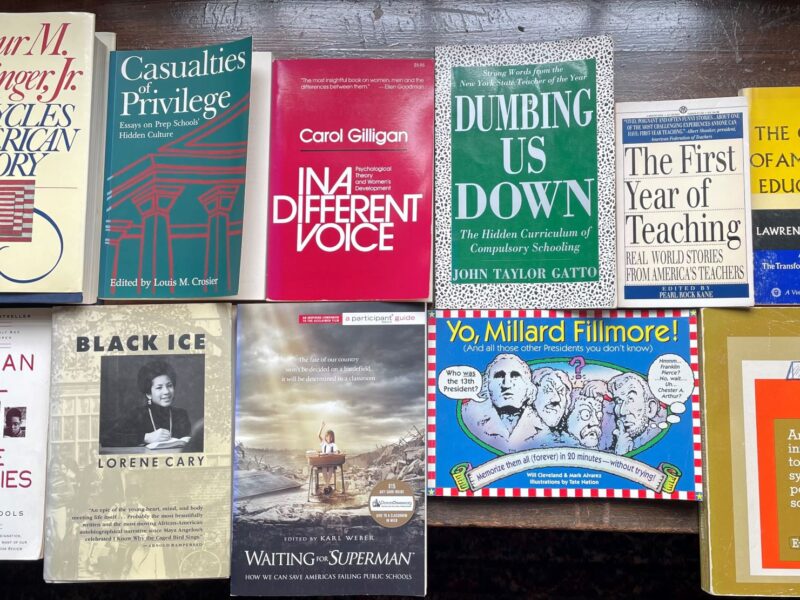The third and final part of my remarks on Curiosity at the recent Fall Family Weekends at Bath and Woodstock spoke to the role that curiosity plays in those circumstances where we think we’ve got something all figured out only to discover we are mistaken.
Here’s a story from my own experience with my mother when curiosity helped me see some things in a new light. From The Biggest Job We’ll Ever Have (Scribner, 2002):
My mother was a wonderful woman, thoughtful, wise, caring, and trustworthy….. when she was sober. Another side came out when she drank, a side characterized by biting sarcasm. There was the morning my sisters and I came downstairs to find a poster-sized professionally designed portrait of my mother greeting us on an easel. It depicted her with a disapproving frown on her face, pointing a finger at us in admonishment. She had left our home on the previous evening vowing never to return and wanted to leave a parting shot. There was the time that she suddenly appeared, inebriated, in my college dormitory my freshman year. I remember wanting to melt into the floor as I felt my friends collectively grasp the notion that this very intoxicated woman who had invaded the dorm was “Malcolm’s Mother.”
I can remember coming home with friends after school and praying that the “good” Mom would be in the house when we got there. The “other” Mom was impossible to deal with and a real embarrassment to me. I remember believing that no other teenager in the world faced a circumstance like this at home. (Of course, I later learned that some of my close friends experienced the same trauma in their homes.) Once I crossed the threshold of our front door, it never took me more than a few seconds to determine which Mom was home. There was a look in her eye, a certain degree of clutter to the house. This determination was always followed by either incredible relief or high anxiety.
Throughout my teens and my twenties I obsessed about my mother’s drinking. As I entered my thirties, I came to understand a simple truth: Although I may not be able to control what my mother’s drinking is doing to her, I can control what it is doing to me. I told my mother that I loved her but that I could no longer hang my emotions on the false hope that her earnest decision to quit drinking alcohol was “around the next bend.” If she wanted to drink, that was ultimately her decision. I would no longer hide bottles or walk on egg shells. I would spend time with her if she was sober. I would not spend time with her if she wasn’t.
This was very hard. My parents had divorced and my sisters were no longer living near our mother. As the child living closest to her, I felt a responsibility to help keep my mother as part of our “family.” To make matters worse, I was struggling with my own use of alcohol – a problem drinker trying to help a problem drinker!
At any rate, I “let go” of my mother’s drinking. I walked away. I would no longer make sure that her heating bill got paid. I would no longer make it a point to be on the look-out to try and intercept her as she walked out her front door on her way to her car to shop for groceries. In short, I would no longer enable her drinking. I resigned myself to an acceptance that she would never quit drinking. This acceptance led the way to a deeper acceptance of my mother, a sense of forgiveness. I decided to value her for the wonderful things she did for me and my sisters. I developed a genuine appreciation for what she tried to do for all of us. I would not judge her for what she was unable to do in her life. I was at peace. However, I was not prepared for what happened next.
Shortly after I announced this to my mother, she both shocked and inspired me. She quit, truly quit, drinking. Although she had been in and out of Alcoholics Anonymous for twenty-five years, at age 60, she made a true commitment to it. Her decision evolved into a fairy tale when my parents re-united and decided to remarry after ten years apart. (They said, “After ten years, we declare our divorce a failure.”) It was a very proud and happy day when my sisters and I attended the marriage of our parents. To this day, I get a kick out of people’s reactions when I say, “When my parents got married, I gave the bride away.” My mother had shown me that she had a major role to play well after I left the nest. As parents, we are never too old to inspire our children. As children, we are never too old to be inspired by them. I discovered that I still had that yearning to be inspired, despite the fact that I had buried all hope of its possibility.
My mother died at sixty-two, less than two years after she had remarried my father. The years of alcohol had exacted their toll. However, her last two years were perhaps the happiest of her life. They were sober ones full of characterized by serenity, for her and for her family. She saw all three of her children have children of their own, the last one becoming a parent only a few months before her death.
My experience taught me to never count anyone out, that it’s possible to let go and simultaneously keep the faith.
Onward, Malcolm Gauld


